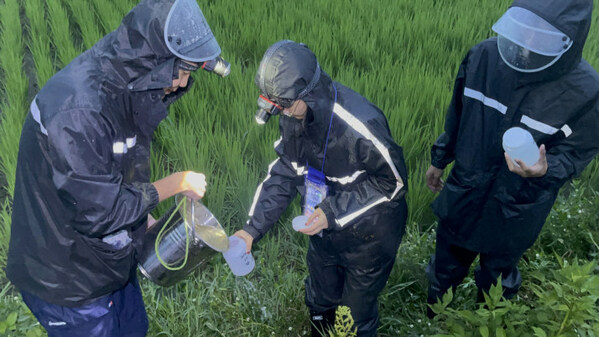DALI, China, June 8, 2023 /PRNewswire/ -- A news report from Beijing Review:

Researchers collect water samples during heavy rain in Gusheng Village, Dali Bai Autonomous Prefecture in Yunnan Province, in August 2022 (COURTESY PHOTO)
Erhai Lake, covering 252 square km, is the mother lake of people in Dali Bai Autonomous Prefecture in Yunnan Province. However, in the 1980s, the lake became so polluted that it emitted a putrid smell. Then, it saw three major blue-green algae outbreaks—in 1996, 2003 and 2013.
In recent years, its water quality has greatly improved thanks to the local government's green efforts such as shutting down mines around the lake and banning the use of fertilizers that contain nitrogen and phosphorus.
However, in spite of the improvement, a lot more needs to be done for the lake's water quality to reach Grade I, the best in China's five-tier quality system for surface water.
As fertilizer use is a major source of pollution, in 2021, Zhang Fusuo, a member of the Chinese Academy of Engineering and head of the National Academy of Agriculture Green Development at China Agricultural University (CAU), who specializes in plant nutrition, was invited by the local government to Dali to help find a greener way to cultivate crops.
In February 2022, CAU, Yunnan Agricultural University and the Dali Bai Autonomous Prefectural Government jointly established the Gusheng Village Science and Technology Backyard (STB) in Gusheng Village in Dali, to explore a new path combining Erhai preservation with high-quality agricultural development. The STB is a program that brings researchers to the rural areas to carry out studies on sustainable agriculture and provide free onsite guidance.
Gusheng Village sits between Cangshan Mountain and Erhai Lake. The Yangxi, one of the 18 rivers that originate from Cangshan Mountain and empty into Erhai Lake, flows through the village.
Zhang and his colleagues have collected thousands of water samples since last April, monitoring the water quality across a 4.8-square-km area from the source of the Yangxi River in Cangshan Mountain, to the village and then to Erhai Lake. Through their analysis of the water samples, the team found the farmland contributed 35 to 55 percent of the pollution.
In addition to identifying polluting sources, Zhang's team had to help the village find ways of growing crops which are both environmentally friendly and economically rewarding.
The team has introduced to villagers an eco-friendly fertilizer for rice and biodegradable mulch to cover the soil to retain moisture and nutrients. Application of these technologies has increased rice output, reduced the runoff of nitrogen and phosphorus and slashed fertilizer costs.
These researchers' efforts to achieve a balance between cleaning up Erhai Lake and increasing farmers' incomes echo the theme of this year's Erhai Forum on Global Ecological Civilization Construction: Man and Nature in Harmony Toward a Path to Modernization.
The forum, held in Dali on May 28, was jointly hosted by China International Communications Group (CICG), the Yunnan Provincial Government and China Public Relations Association. More than 400 experts, scholars, government officials and corporate executives participated in the forum.
At the event, Zhang shared the team's experiences. He said he hopes the experiments he and his colleagues have carried out in Gusheng Village will provide an example of high-quality and green agricultural development for the whole country and contribute to global sustainable development.
At the forum, Du Zhanyuan, President of CICG, emphasized that ecology is crucial to human survival and development. He pointed out that Chinese modernization is the modernization featuring harmony between humanity and nature.
Du expressed his hope that nations could exchange experiences and technologies related to climate change, energy conservation and emission reduction, to foster a global environmental governance system characterized by fairness, rationality and mutually beneficial cooperation.
Hans Lambers, a fellow with the Royal Netherlands Academy of Arts and Sciences and the Australian Academy of Science, told Beijing Review that short-term benefits are too often pursued despite greater long-term losses, when asked about the difficulties in balancing economic development and environmental protection. "Preventing pollution, such as what happened to Erhai Lake, is much cheaper than repairing the damage. A long-term vision is required, rather than a focus on short-term benefits," he said.